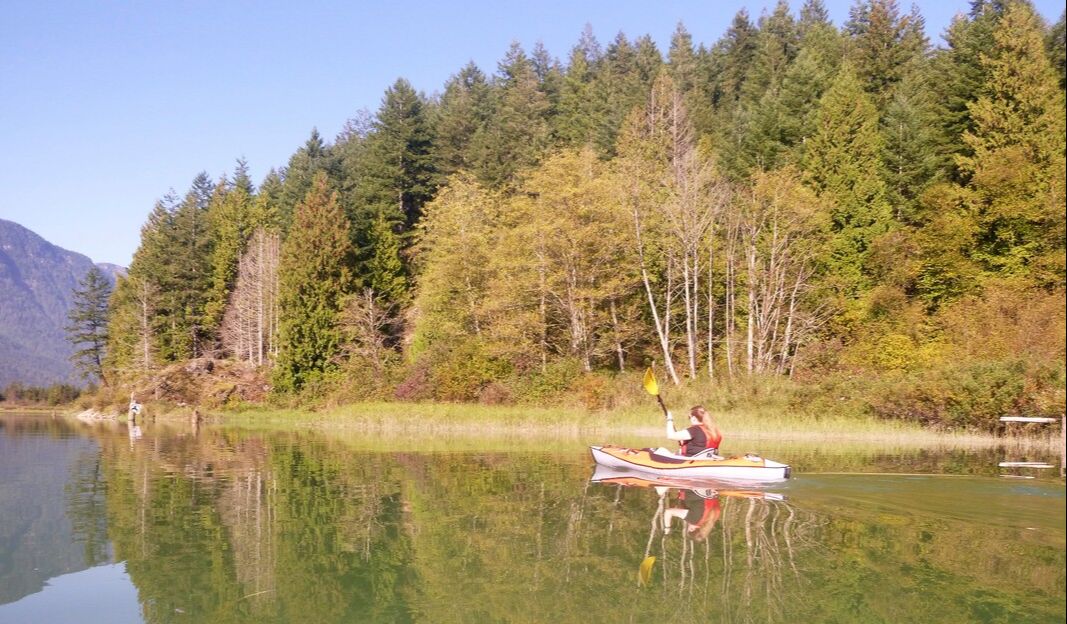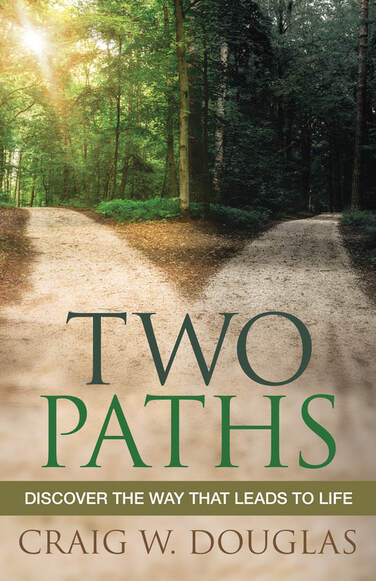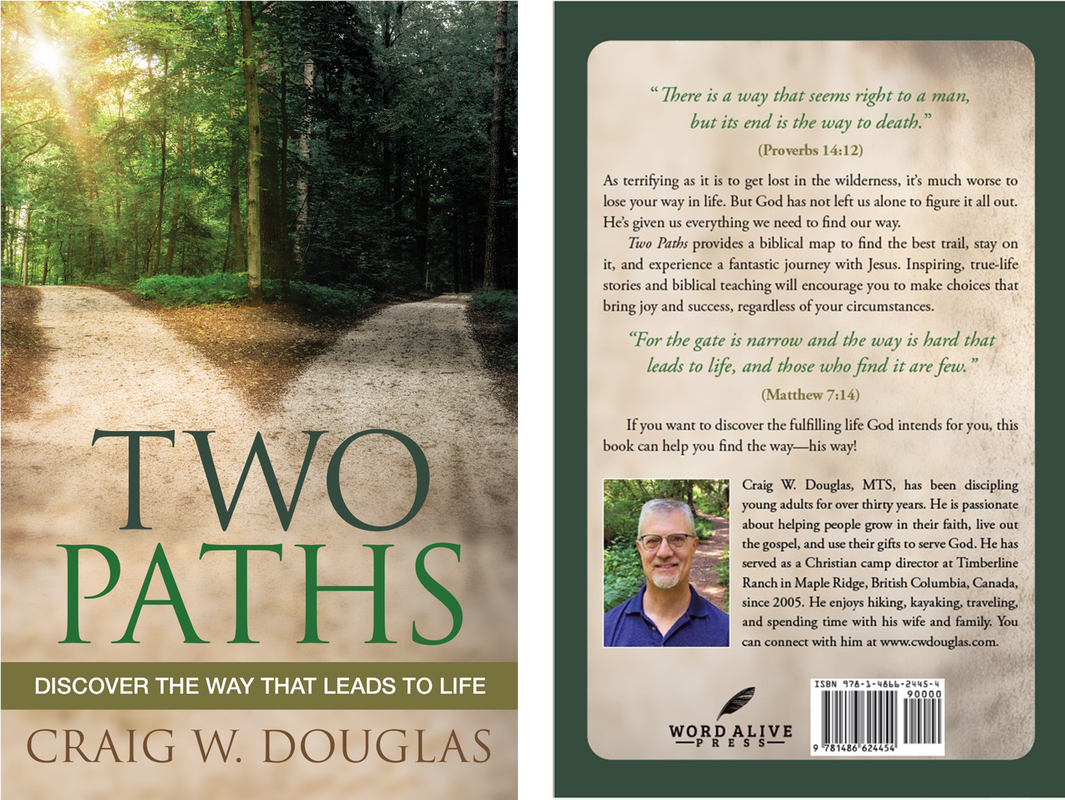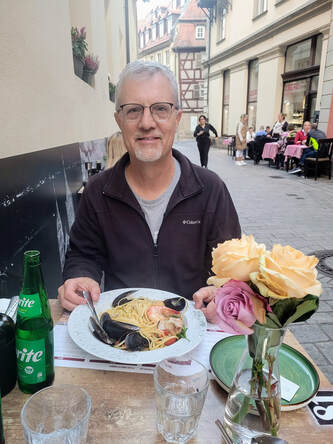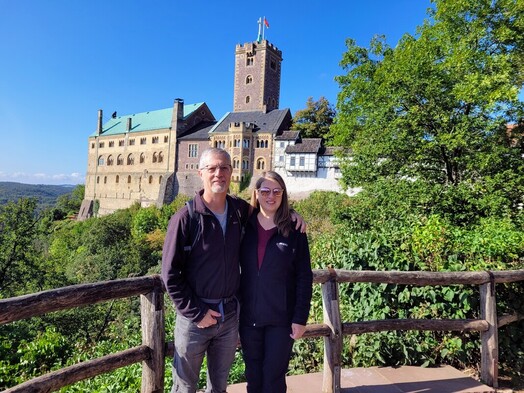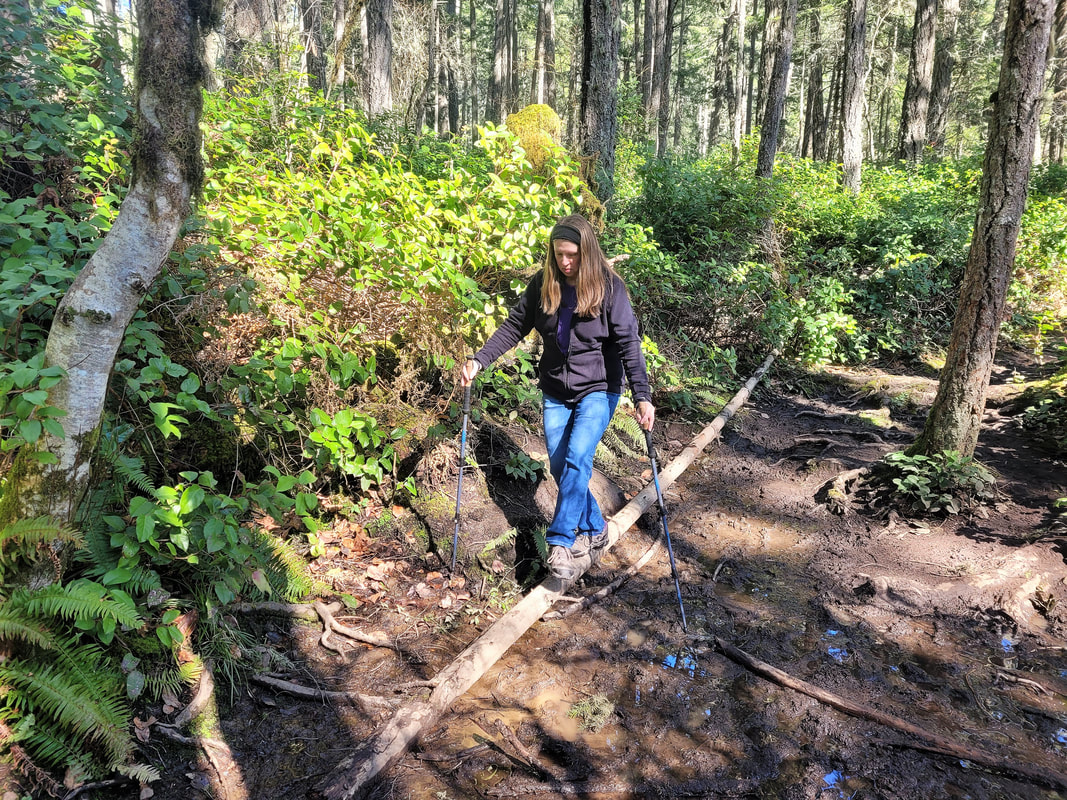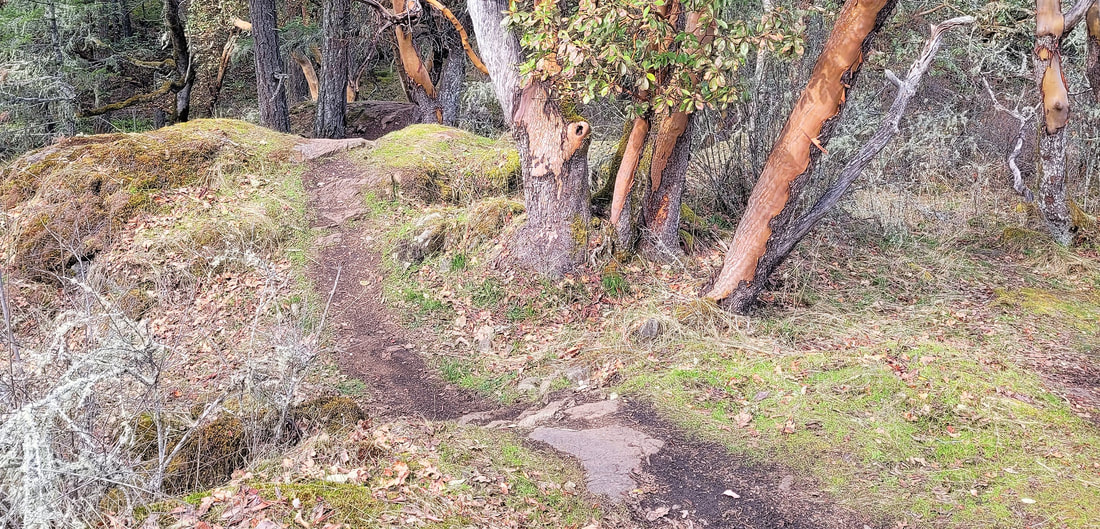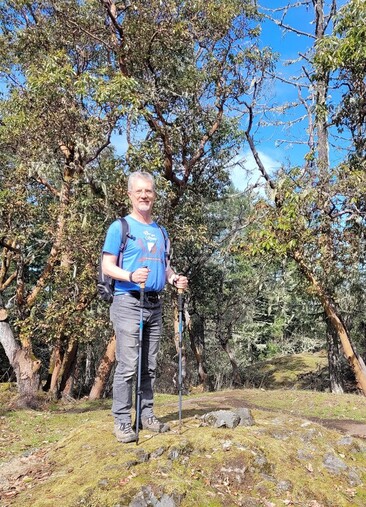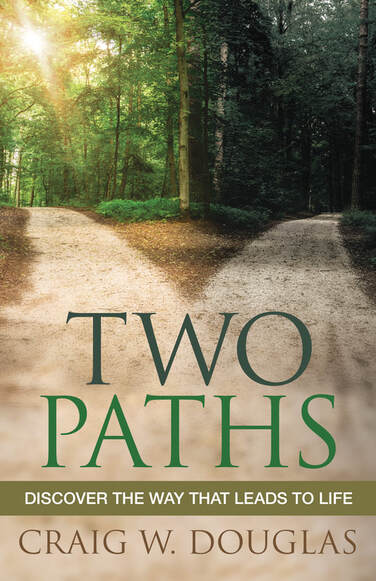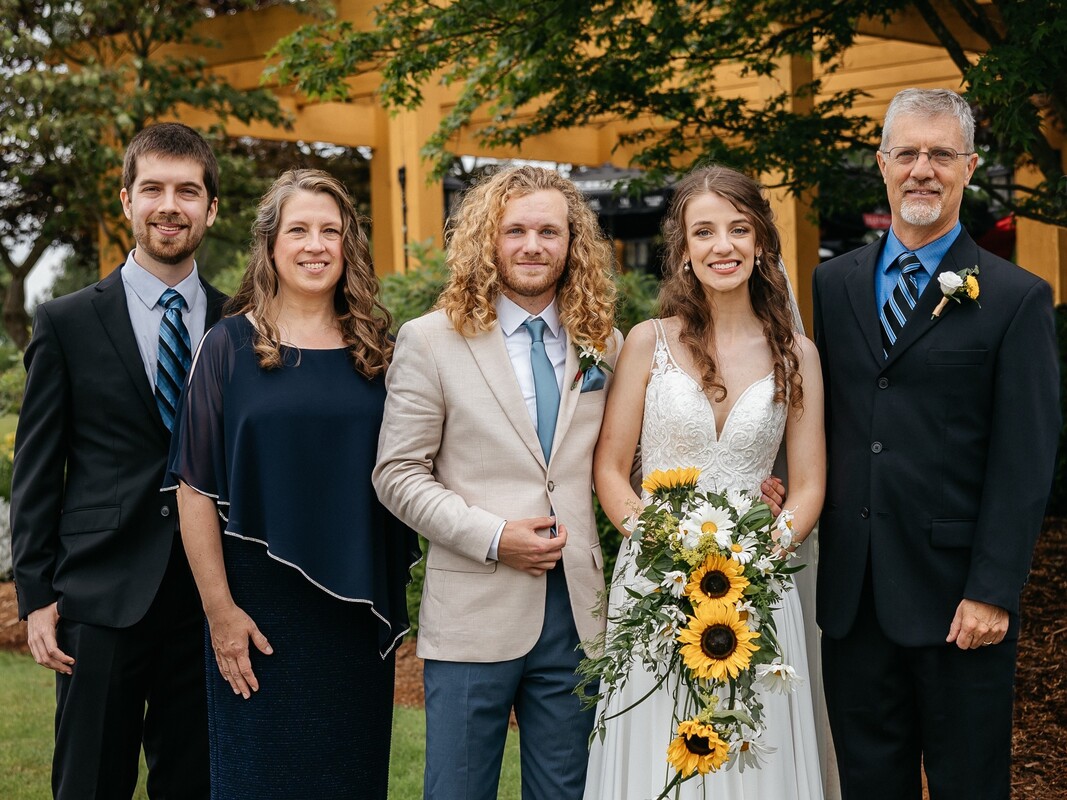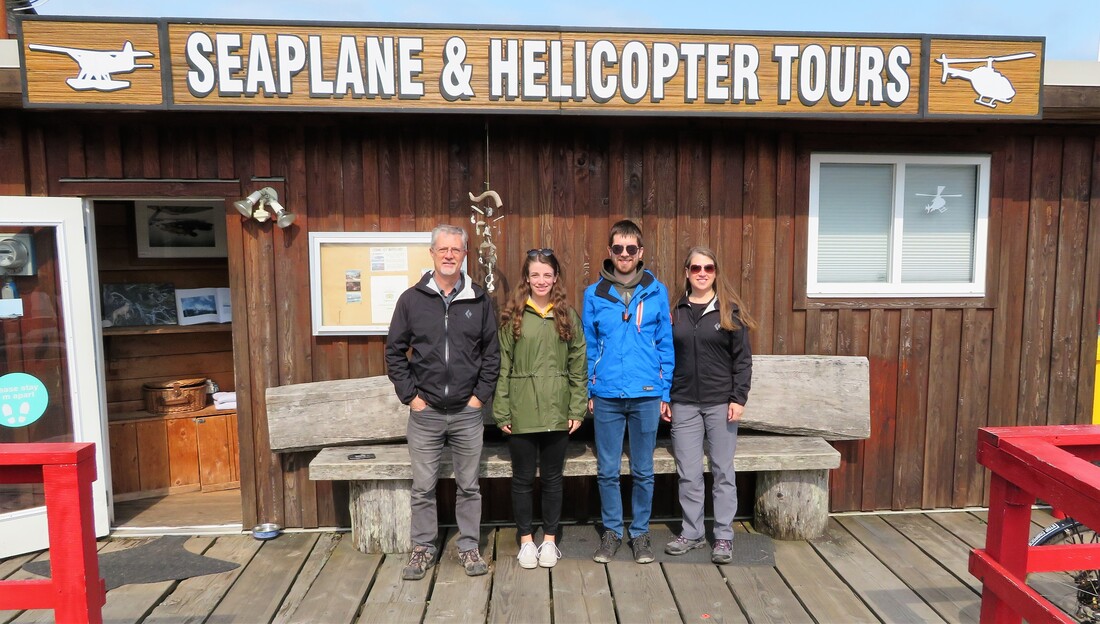Two Paths: Discover the Way that Leads to Life |
| “The beginning of wisdom is this: Get wisdom, and whatever you get, get insight. Prize her highly, and she will exalt you; she will honor you if you embrace her.” |
The very beginning of becoming wise is to realize that you need wisdom! “Get wisdom … get insight. Prize her highly …” So where do we find wisdom?
Not long ago, my wife, Leanne, and I decided to kayak on Pitt Lake, just a twenty-minute drive from where we live, yet new for us. I had heard from others that there was a lovely river and campground accessible on the other side of the lake. I quickly looked at a map, and it seemed straightforward: cross the lake and paddle up the stream to the campground. However, after we crossed the lake, I couldn’t see any river opening. We turned north and traveled along the shore until we found the mouth of a creek, but it didn’t go anywhere and quickly became too shallow. So we turned south and eventually found the river behind a little island I had overlooked on the map. By this time, it was getting late, so we paddled back across the lake and went home.
BONUS TIP: Hoping for the best should never be called a plan.
You can be sure the next time we went to Pitt Lake—on a beautiful, sunny day in October—I was much more prepared! I studied a map carefully, noted a better angle to cross the lake, and ensured I knew how far it was up to the campground. As expected, we easily found the river opening and proceeded up the river.
At one point, we could choose between two river channels that looked relatively equal in depth and width. I suddenly wished I had a map with me, but fortunately, as we got closer, we saw a sign pointing to the left for the campground. So helpful!
We continued up the river, laughing and having a great time. However, it was still quite far, and I wondered if we should turn back soon. Just as I was about to give up and turn around, two guys in a canoe came around a bend towards us, so I asked them how far to the campsite. “Like, two hundred meters,” they said, “just around that bend.” Great! So we paddled a little further, found the campsite, had a nice little break wandering around, took a few photos, ate a snack, and headed back.
What did it take for us to get to the campsite? A map, a sign, and a couple of friendly canoers. Then it just took some effort paddling. Similarly, we find wisdom through the maps, signs, and people God provides for us. His Word is like a map, his Spirit in us is like a sign, and his people—the community of believers—are also there to help us, encourage us, and keep us headed in the right direction. Wisdom comes from him.
. . .
MOTORCYCLE TRIP
One of the most foolish things I’ve done was choosing to ride my motorcycle to college, riding 1,500 kilometers in just over a day. I had just finished an exhausting summer at camp, and I needed to get to school in thirty hours.
I was young and strong, so how hard could it be? I calculated that I only had to average about fifty kilometers per hour to get there on time, so I could travel at about one hundred kilometers an hour and have plenty of time for breaks. I would drink lots of coffee, which would carry me through the night, and hey, I had ridden a few hundred kilometers before, so what was 1,500?
It was a grueling trip, and it could have killed me. I rode through the mountains in the middle of the night, and I was so cold that I tailed closely behind a semi-truck for a windbreak. By the time I found an open coffee shop at about 5:30 a.m., I was shivering and shaking so much that I could barely even hold my coffee or take a sip. A few hours of riding later, I was so sleepy that I had to pull over to the side of the highway and lie down for an hour or so while the trucks thundered past me. Not wise!
BONUS TIP: Don’t do that.
I finally made it to college and to a meeting I was required to attend—on time. What an accomplishment … at the risk of my life! That night as I slept in my dorm room, I hit my head on the side of my desk without even waking up. When I finally awoke the next day, I had a nasty cut beside my eye and blood on my pillow. It probably served me right.
KNOWLEDGE IS NOT WISDOM
There is a vast difference between knowledge and wisdom. Sometimes knowledge and wisdom are used interchangeably, but there are two different concepts here we need to distinguish.
Knowledge means to obtain information, which is easy to do. I can find out almost anything I need or want to know in a few seconds online. If I wonder about an actor in a movie I’m watching, before the scene even changes I can pull out my phone and find out his name, what other roles he’s been in, his birthdate, where he grew up, and much more.
Wisdom, however, goes beyond knowledge. It’s the proper or sound application of information. It means seeing two or more paths, understanding where each leads, and choosing the one that will take you where you should go. It’s making the best decisions based on the information you have and getting more information if you need it.
Knowledge understands the force of gravity and how falling a great distance can injure or kill a person. It acknowledges fences along a cliff and signs warning about the danger of getting too close to the edge. But that knowledge only helps a person if they are wise enough to heed the warnings and stay on the safe side of the fence. A person can be very knowledgeable yet still very foolish.
I knew how to ride a motorcycle, how far I needed to go, and the speed I needed to average to make it to college on time. But it was foolish to try to get there in such a short time, especially given my exhaustion and inexperience traveling such a distance. I would have been wise to leave camp earlier or take a bus instead of riding my bike that far. Unfortunately, wisdom is not highly sought-after in this world.
When I was growing up, prude was an insult for someone who refused to follow the crowd when they were drinking, smoking, or otherwise acting foolishly. Interestingly, prude comes from prudence, another word for wisdom. Being wise has never been considered cool, and those who don’t follow the crowd will usually be resented.
Knowledge only takes us so far. Wisdom is essential as we chart a course for our lives and make daily decisions that affect our journey and ultimate destination.
. . .
Friends, if you would like to purchase a copy of this book or donate to help get it into the hands of those who need it, please follow this link. Thanks for taking the time to read this. Your likes and comments are appreciated!
BONUS TIP: Hoping for the best should never be called a plan.
You can be sure the next time we went to Pitt Lake—on a beautiful, sunny day in October—I was much more prepared! I studied a map carefully, noted a better angle to cross the lake, and ensured I knew how far it was up to the campground. As expected, we easily found the river opening and proceeded up the river.
At one point, we could choose between two river channels that looked relatively equal in depth and width. I suddenly wished I had a map with me, but fortunately, as we got closer, we saw a sign pointing to the left for the campground. So helpful!
We continued up the river, laughing and having a great time. However, it was still quite far, and I wondered if we should turn back soon. Just as I was about to give up and turn around, two guys in a canoe came around a bend towards us, so I asked them how far to the campsite. “Like, two hundred meters,” they said, “just around that bend.” Great! So we paddled a little further, found the campsite, had a nice little break wandering around, took a few photos, ate a snack, and headed back.
What did it take for us to get to the campsite? A map, a sign, and a couple of friendly canoers. Then it just took some effort paddling. Similarly, we find wisdom through the maps, signs, and people God provides for us. His Word is like a map, his Spirit in us is like a sign, and his people—the community of believers—are also there to help us, encourage us, and keep us headed in the right direction. Wisdom comes from him.
. . .
MOTORCYCLE TRIP
One of the most foolish things I’ve done was choosing to ride my motorcycle to college, riding 1,500 kilometers in just over a day. I had just finished an exhausting summer at camp, and I needed to get to school in thirty hours.
I was young and strong, so how hard could it be? I calculated that I only had to average about fifty kilometers per hour to get there on time, so I could travel at about one hundred kilometers an hour and have plenty of time for breaks. I would drink lots of coffee, which would carry me through the night, and hey, I had ridden a few hundred kilometers before, so what was 1,500?
It was a grueling trip, and it could have killed me. I rode through the mountains in the middle of the night, and I was so cold that I tailed closely behind a semi-truck for a windbreak. By the time I found an open coffee shop at about 5:30 a.m., I was shivering and shaking so much that I could barely even hold my coffee or take a sip. A few hours of riding later, I was so sleepy that I had to pull over to the side of the highway and lie down for an hour or so while the trucks thundered past me. Not wise!
BONUS TIP: Don’t do that.
I finally made it to college and to a meeting I was required to attend—on time. What an accomplishment … at the risk of my life! That night as I slept in my dorm room, I hit my head on the side of my desk without even waking up. When I finally awoke the next day, I had a nasty cut beside my eye and blood on my pillow. It probably served me right.
KNOWLEDGE IS NOT WISDOM
There is a vast difference between knowledge and wisdom. Sometimes knowledge and wisdom are used interchangeably, but there are two different concepts here we need to distinguish.
Knowledge means to obtain information, which is easy to do. I can find out almost anything I need or want to know in a few seconds online. If I wonder about an actor in a movie I’m watching, before the scene even changes I can pull out my phone and find out his name, what other roles he’s been in, his birthdate, where he grew up, and much more.
Wisdom, however, goes beyond knowledge. It’s the proper or sound application of information. It means seeing two or more paths, understanding where each leads, and choosing the one that will take you where you should go. It’s making the best decisions based on the information you have and getting more information if you need it.
Knowledge understands the force of gravity and how falling a great distance can injure or kill a person. It acknowledges fences along a cliff and signs warning about the danger of getting too close to the edge. But that knowledge only helps a person if they are wise enough to heed the warnings and stay on the safe side of the fence. A person can be very knowledgeable yet still very foolish.
I knew how to ride a motorcycle, how far I needed to go, and the speed I needed to average to make it to college on time. But it was foolish to try to get there in such a short time, especially given my exhaustion and inexperience traveling such a distance. I would have been wise to leave camp earlier or take a bus instead of riding my bike that far. Unfortunately, wisdom is not highly sought-after in this world.
When I was growing up, prude was an insult for someone who refused to follow the crowd when they were drinking, smoking, or otherwise acting foolishly. Interestingly, prude comes from prudence, another word for wisdom. Being wise has never been considered cool, and those who don’t follow the crowd will usually be resented.
Knowledge only takes us so far. Wisdom is essential as we chart a course for our lives and make daily decisions that affect our journey and ultimate destination.
. . .
Friends, if you would like to purchase a copy of this book or donate to help get it into the hands of those who need it, please follow this link. Thanks for taking the time to read this. Your likes and comments are appreciated!
0 Comments
Two Paths: Discover the Way that Leads to Life
Excerpts from Introduction: The Journey Ahead
Somehow, I took the wrong path and ended up far from where I wanted to go.
It was a beautiful spring day, and our family was visiting my mother in Victoria, British Columbia, Canada. My teenage daughter, Lorelle, and I decided to spend the afternoon hiking up Mount Finlayson, a relatively short but steep hike with a gorgeous view of the Olympic Mountains across the Strait of Juan de Fuca.
Lorelle is always game for exercise and adventure and was happy to leave the planning details to me—and the carrying of our pack with the water bottles and snacks. We drove to Goldstream Park and started up the trail among towering Douglas firs. I had to stop several times to take photos—a compulsion of mine. The path started out steep and then got steeper, but after about an hour of scrambling over roots and rocks, we made it to the top, took some great photos, and enjoyed a less-than-healthy cookie snack.
Before leaving home, I had checked an online map and had seen a loop we could take around the back of the mountain on the way down. It was somewhat longer, but it looked interesting, so I suggested we go that way. Lorelle liked the idea, and we began our descent. Counting on my good sense of direction, I knew that staying to the right would provide a clockwise route around the mountain and back to where we parked.
Unfortunately, we kept coming to trails I thought we should take, and they were blocked off and marked “closed,” I assume for repair. I had no paper map with me, but I trusted my instincts to find the way back. However, it wasn’t long until I realized that my strategy of staying to the right was not working. We seemed to be walking in the wrong direction.
Eventually, the trail unexpectedly came out on a road, and I had no idea where we were. So I belatedly decided to check a map app on my phone. Sure enough, we had gone far out of our way. As the crow flies, we were literally about twice as far from the car as we had been on the summit! Fortunately, using my phone map, we were able to find our way along the roads back to Goldstream Park. However, my misdirection cost us almost an extra hour of hiking—on what should have been less than a two-hour hike!
Crossroads
I still don’t know exactly where I went wrong on that hike. I’ve since looked over the maps, and I have some theories. All I know is that I must have taken a wrong turn somewhere. I stood at a crossroads, a fork in the trail, and chose poorly.
I love hiking, and I’m so blessed to live in a part of the world where hiking trails abound. There are hundreds of great trails within an hour of where I’ve lived for the past eighteen years in Maple Ridge, British Columbia. Yet in my adventures, I have discovered that not all paths are equal. Some lead to wondrous vistas and views, interesting rock formations, beautiful waterfalls, and incredible scenery. Others are much less interesting, and some are even quite dangerous. Certain paths start out looking promising, but they slowly dwindle to nothing or take you farther from your desired destination.
It’s so easy to go the wrong way! I’ve often taken wrong or useless paths, only to retrace my steps. Other times, I’ve followed a trail that reviewers enjoyed, only to be disappointed. Sometimes my chosen routes have taken me into difficult circumstances, and occasionally, they have led me into unexpected danger.
Life’s decisions are a lot like choosing a trail. There are options all around us as to where we will go and how we will spend these few precious years on this planet. The challenge is knowing where to go and what to do with that time.
. . .
Finding Guidance
Once, when camping, I found my way to an outhouse in the middle of the night. The sky was overcast, the area heavily treed, and it was pitch black, so I relied on my flashlight to see the path. I must have gotten turned around on the way back from the outhouse, and I started down a trail that didn’t lead back to my tent. I experienced momentary panic as I realized I had no idea which direction to go to get back on track.
Even with my little flashlight, I could barely see the trail and didn’t know where it would lead. Fortunately, even in my sleepy state, I was sensible enough to turn around and head back to the outhouse. I then tried to remember what angle I had walked to it from my tent, and I eventually found my way back safely. I must admit, however, that it was somewhat disconcerting and even a little frightening. I would have been in a difficult situation if my flashlight had lost power.
I’m so glad God doesn’t leave us to fend for ourselves in the dark. He hasn’t simply given us life and breath and said, “Okay, people, now you go figure it out. Good luck!” Instead, he has given us wisdom from his Word, his Spirit, and his people to guide us. We don’t have to guess where to go or how to live. We can know his will and the paths he wants us to take.
God’s Word in Proverbs tells us, “Ponder the path of your feet; then all your ways will be sure” (Proverbs 4:26). Ponder. Consider. Think about the path you’re on and where it’s taking you. Wisely decide where to go. Proverbs also says, “There is a way that seems right to a man, but its end is the way to death” (Proverbs 14:12).
The alternative to thoughtfully and wisely choosing our steps is to carelessly go wherever seems or feels good and right. That’s a path that leads to death! We have but one life to live. That’s it! Then we enter eternity. Not only is our destiny at stake, but the quality and meaning of our lives. It can so easily be wasted if we choose unwisely.
The following chapters will take us on a journey through scripture and real-life experiences to illustrate the way of wisdom and how to make choices that will result in a full, productive, and meaningful life. I pray that God’s Spirit will use this book to help guide you in his ways.
. . .
Friends, if you would like to purchase a copy of this book or donate to help get it into the hands of those who need it, please follow this link. Thanks for taking the time to read this. Your likes and comments are appreciated!
It was a beautiful spring day, and our family was visiting my mother in Victoria, British Columbia, Canada. My teenage daughter, Lorelle, and I decided to spend the afternoon hiking up Mount Finlayson, a relatively short but steep hike with a gorgeous view of the Olympic Mountains across the Strait of Juan de Fuca.
Lorelle is always game for exercise and adventure and was happy to leave the planning details to me—and the carrying of our pack with the water bottles and snacks. We drove to Goldstream Park and started up the trail among towering Douglas firs. I had to stop several times to take photos—a compulsion of mine. The path started out steep and then got steeper, but after about an hour of scrambling over roots and rocks, we made it to the top, took some great photos, and enjoyed a less-than-healthy cookie snack.
Before leaving home, I had checked an online map and had seen a loop we could take around the back of the mountain on the way down. It was somewhat longer, but it looked interesting, so I suggested we go that way. Lorelle liked the idea, and we began our descent. Counting on my good sense of direction, I knew that staying to the right would provide a clockwise route around the mountain and back to where we parked.
Unfortunately, we kept coming to trails I thought we should take, and they were blocked off and marked “closed,” I assume for repair. I had no paper map with me, but I trusted my instincts to find the way back. However, it wasn’t long until I realized that my strategy of staying to the right was not working. We seemed to be walking in the wrong direction.
Eventually, the trail unexpectedly came out on a road, and I had no idea where we were. So I belatedly decided to check a map app on my phone. Sure enough, we had gone far out of our way. As the crow flies, we were literally about twice as far from the car as we had been on the summit! Fortunately, using my phone map, we were able to find our way along the roads back to Goldstream Park. However, my misdirection cost us almost an extra hour of hiking—on what should have been less than a two-hour hike!
Crossroads
I still don’t know exactly where I went wrong on that hike. I’ve since looked over the maps, and I have some theories. All I know is that I must have taken a wrong turn somewhere. I stood at a crossroads, a fork in the trail, and chose poorly.
I love hiking, and I’m so blessed to live in a part of the world where hiking trails abound. There are hundreds of great trails within an hour of where I’ve lived for the past eighteen years in Maple Ridge, British Columbia. Yet in my adventures, I have discovered that not all paths are equal. Some lead to wondrous vistas and views, interesting rock formations, beautiful waterfalls, and incredible scenery. Others are much less interesting, and some are even quite dangerous. Certain paths start out looking promising, but they slowly dwindle to nothing or take you farther from your desired destination.
It’s so easy to go the wrong way! I’ve often taken wrong or useless paths, only to retrace my steps. Other times, I’ve followed a trail that reviewers enjoyed, only to be disappointed. Sometimes my chosen routes have taken me into difficult circumstances, and occasionally, they have led me into unexpected danger.
Life’s decisions are a lot like choosing a trail. There are options all around us as to where we will go and how we will spend these few precious years on this planet. The challenge is knowing where to go and what to do with that time.
. . .
Finding Guidance
Once, when camping, I found my way to an outhouse in the middle of the night. The sky was overcast, the area heavily treed, and it was pitch black, so I relied on my flashlight to see the path. I must have gotten turned around on the way back from the outhouse, and I started down a trail that didn’t lead back to my tent. I experienced momentary panic as I realized I had no idea which direction to go to get back on track.
Even with my little flashlight, I could barely see the trail and didn’t know where it would lead. Fortunately, even in my sleepy state, I was sensible enough to turn around and head back to the outhouse. I then tried to remember what angle I had walked to it from my tent, and I eventually found my way back safely. I must admit, however, that it was somewhat disconcerting and even a little frightening. I would have been in a difficult situation if my flashlight had lost power.
I’m so glad God doesn’t leave us to fend for ourselves in the dark. He hasn’t simply given us life and breath and said, “Okay, people, now you go figure it out. Good luck!” Instead, he has given us wisdom from his Word, his Spirit, and his people to guide us. We don’t have to guess where to go or how to live. We can know his will and the paths he wants us to take.
God’s Word in Proverbs tells us, “Ponder the path of your feet; then all your ways will be sure” (Proverbs 4:26). Ponder. Consider. Think about the path you’re on and where it’s taking you. Wisely decide where to go. Proverbs also says, “There is a way that seems right to a man, but its end is the way to death” (Proverbs 14:12).
The alternative to thoughtfully and wisely choosing our steps is to carelessly go wherever seems or feels good and right. That’s a path that leads to death! We have but one life to live. That’s it! Then we enter eternity. Not only is our destiny at stake, but the quality and meaning of our lives. It can so easily be wasted if we choose unwisely.
The following chapters will take us on a journey through scripture and real-life experiences to illustrate the way of wisdom and how to make choices that will result in a full, productive, and meaningful life. I pray that God’s Spirit will use this book to help guide you in his ways.
. . .
Friends, if you would like to purchase a copy of this book or donate to help get it into the hands of those who need it, please follow this link. Thanks for taking the time to read this. Your likes and comments are appreciated!
Ten Things I Loved About Our Europe Trip
Leanne and I had the opportunity to head to Europe for the first month of my Sabbatical.
We flew to Frankfurt (Germany), rented a car, and then drove to (and stayed in) Cologne, Ghent (Belgium), Utrecht (Netherlands), Berlin, Erfurt, Bamberg, Rothenburg, and Rust.
It was an amazing trip, and we are incredibly thankful for the opportunity to travel like this and be freed from our resopnsibilities at Timberline Ranch (where I have served as Executive Director for the past 18 years).
We experienced so much, but here are ten great things about our trip (in no particular order):
#10 Transportation
We flew to Frankfurt (Germany), rented a car, and then drove to (and stayed in) Cologne, Ghent (Belgium), Utrecht (Netherlands), Berlin, Erfurt, Bamberg, Rothenburg, and Rust.
It was an amazing trip, and we are incredibly thankful for the opportunity to travel like this and be freed from our resopnsibilities at Timberline Ranch (where I have served as Executive Director for the past 18 years).
We experienced so much, but here are ten great things about our trip (in no particular order):
#10 Transportation
I know it’s a little weird, but I love transit systems and figuring out how to navigate them. I love the trams that move almost silently through crowded streets, subways that pop you up wherever you want to go, and trains that speed you into the city center. Oh, and big train stations are pretty cool, too! Finally, I have to say that I was thankful for a fairly powerful car (2023 VW Passat) that was able to move us along the Autobahn at whatever speed we needed. Fun!
#9 War History
#9 War History
In four of the cities we visited (Cologne, Ypres, Berlin, Haarlem), we took time to visit museums that specifically taught some aspect about the world wars in Europe. It was amazing to learn about these things from a European perspective. I think what stood out the most to me was seeing the results of those wars all these years later in those cities that were bombed or demolished and how the wars have molded those societies today. In North America, our people fought in those wars, but those who survived came back to their old homes and lives. Not so for those in Europe who fought and then had to rebuilt for much of the rest of their lives. PHOTO: Checkpoint Charlie, Berlin.
#8 Canals
#8 Canals
Let’s face it, canals make for great photos! I loved walking through cities with canals, especially Bruges, Ghent, and Bamberg. PHOTO: Bruges
#7 Walled Cities & Fortresses
#7 Walled Cities & Fortresses
Okay, so Rothenburg is my new favorite walled city (sorry, Carcassonne!). It is amazing, and you can walk along the wall almost all the way around the city (without charging an arm and a leg - looking at your Dubrovnik!). Anyway, Erfurt was also pretty cool with the big fortress and medieval look, but Rothenburg, well, you just have to go there. PHOTO: Rothenburg
#6 Culture
#6 Culture
Although we did, of course, visit the touristy places in many towns, some of my favorite times were just walking through neighborhoods, going off the beaten trail, shopping in little grocery stores, or even going to a laundromat. It was fun to experience the different cultures and meet lots of interesting people.
#5 Food!
#5 Food!
Although we cooked most of our suppers where we stayed, packed lunches, and ate simple breakfasts (mostly muesli cereals, though even these often had chocolate bits in them!), we did sample many different things along the way. This included fries (which are huge in Europe, especially Belgium, and are normally eaten with a little bamboo fork), Belgian waffles (“liege” are the absolute best!), several kinds of wurst (usually in a bun), many snacks you only find over there, and so on. The few outdoor cafes we ate at were also quite wonderful! PHOTO: Bamburg
#4 Martin Luther History
#4 Martin Luther History
Okay, I geeked out a bit when I saw the church Martin Luther served in (and hung the 95 Theses on) and the cell where he wrote the German New Testament! But we also toured where he had been a monk, saw the house he grew up in and so on. Pretty cool, considering how all of western culture was radically transformed in many ways because of his obedience to God. PHOTO: Wartburg Castle
#3 Castles & Cathedrals
#3 Castles & Cathedrals
Yes, Europe has castles and cathedrals! To be honest, we tired somewhat quickly of seeing yet another amazing cathedral, but castles, well, they’re all so different and special. Not that we visited many (or I suppose we could have tired of them, too), but wow, the architecture of both cathedrals and castles, especially where they have served 800+ years, was simply amazing! PHOTO: De Haar Castle, Utrecht
#2 Theme Parks
#2 Theme Parks
Okay, so who goes to Europe for a month and visits three different theme parks, spending five of their thirty days going on roller coasters? That would be us, for sure! We absolutely loved Phantasialand, Efteling, and Europa Park. What a blast! PHOTO: Europa Park, Rust, Germany
#1 Time Together
#1 Time Together
Finally, I’ll just say that despite often being tired, feeling unwell, or struggling with navigating a new city, Leanne and I had an amazing time together! It was so great to enjoy unrushed, uninterrupted time and remember why we married each other. There is nothing like exploring Europe with your best friend!
The Less Obvious Path
A couple of months ago, Leanne and I tried a new hike near Victoria that I had found on my hiking app. It looked like an easy trail to follow. It began by a pretty lake and then climbed steeply. Although there were many crisscrossing trails, it seemed obvious that we would reach the summit if we stayed on the main path.
After about half an hour, we reached a path that split in two directions, and it seemed to me that the main trail headed in the entirely wrong direction. So, I took the less traveled route, which followed a creek bed for a little way. But then it seemed to peter out.
Finally – and I know you’re wondering why it took so long – I opened the app on my phone and looked at the map. According to the GPS on the phone, we were nowhere near where I thought we were! Neither of the two trails was going to get us to our destination. In fact, we back-tracked for a good five to ten minutes – downhill – before finding a different connecting trail that would eventually take us where we wanted to go. We walked a whole lot extra, half uphill, simply because I thought the route was “obvious.” Somewhat exhausted, we finally made the summit and enjoyed an excellent view with Haro Strait and Mount Baker in the background.
Finally – and I know you’re wondering why it took so long – I opened the app on my phone and looked at the map. According to the GPS on the phone, we were nowhere near where I thought we were! Neither of the two trails was going to get us to our destination. In fact, we back-tracked for a good five to ten minutes – downhill – before finding a different connecting trail that would eventually take us where we wanted to go. We walked a whole lot extra, half uphill, simply because I thought the route was “obvious.” Somewhat exhausted, we finally made the summit and enjoyed an excellent view with Haro Strait and Mount Baker in the background.
Going a few minutes out of your way when hiking can be annoying, especially on a long hike, but it’s not usually disastrous. Losing your path in life is a lot more dangerous. For many Christians today, the path they should take seems “obvious”: go to church when convenient, read your Bible occasionally, help out where you can, be a good worker, spouse, and parent, and enjoy life. When things get tough, pray more or talk to someone who can help.
Unfortunately, that’s a trail that leads . . . nowhere. Proverbs 14:12 says:
There is a way that seems right to a man, but its end is the way to death.
It’s not my place to judge anyone (I have enough of my own sins), but it seems that many people who call themselves Christians are on the wrong path. Before you nod and start thinking about those people, consider for a moment your own life. How do you know you are heading in the right direction? Is it based on solid biblical teaching or on simply doing what you observe other Christians doing?
According to Jesus, the “obvious” path is not usually the right one.
“Enter through the narrow gate. For wide is the gate and broad is the road that leads to destruction, and many enter through it. But small is the gate and narrow the road that leads to life, and only a few find it.” (Matthew 7:13-14)
Unfortunately, that’s a trail that leads . . . nowhere. Proverbs 14:12 says:
There is a way that seems right to a man, but its end is the way to death.
It’s not my place to judge anyone (I have enough of my own sins), but it seems that many people who call themselves Christians are on the wrong path. Before you nod and start thinking about those people, consider for a moment your own life. How do you know you are heading in the right direction? Is it based on solid biblical teaching or on simply doing what you observe other Christians doing?
According to Jesus, the “obvious” path is not usually the right one.
“Enter through the narrow gate. For wide is the gate and broad is the road that leads to destruction, and many enter through it. But small is the gate and narrow the road that leads to life, and only a few find it.” (Matthew 7:13-14)
The Christian life is not about trying to be good enough until we die and go to heaven. It’s certainly not about being comfortable.
“Whoever wants to be my disciple must deny themselves and take up their cross and follow me. For whoever wants to save their life will lose it, but whoever loses their life for me will find it. What good will it be for someone to gain the whole world, yet forfeit their soul? Or what can anyone give in exchange for their soul?” (Matthew 16:24b-26)
Following Jesus means taking a road that’s rough, difficult, and at times frightening. It’s amazing because Jesus accompanies us, but it’s never easy. So, if you’re coasting along in life, that’s not the narrow road. That’s some other path that may have seemed obvious, but it’s probably not taking you where you think it is.
The Christian life isn’t about getting our own way, either. It isn’t about making people around us follow a bunch of rules, as if that’s what Jesus taught. It certainly isn’t about being part of a political party or hating those who don’t obey your interpretation of the Bible. That sort of thinking is the wrong path.
“A new command I give you: Love one another. As I have loved you, so you must love one another. By this everyone will know that you are my disciples, if you love one another.” (John 13:34-35)
How was this a new command? Wasn’t God’s ethic from day one that we love others? Yes, it was. The two greatest commands from the Old Testament were to love God and others (See Mt. 22:36-40). But the identity of God’s people was in their obedience to the Law. This is a new command because the Christian’s identity is to be Love, not Law.
“Whoever wants to be my disciple must deny themselves and take up their cross and follow me. For whoever wants to save their life will lose it, but whoever loses their life for me will find it. What good will it be for someone to gain the whole world, yet forfeit their soul? Or what can anyone give in exchange for their soul?” (Matthew 16:24b-26)
Following Jesus means taking a road that’s rough, difficult, and at times frightening. It’s amazing because Jesus accompanies us, but it’s never easy. So, if you’re coasting along in life, that’s not the narrow road. That’s some other path that may have seemed obvious, but it’s probably not taking you where you think it is.
The Christian life isn’t about getting our own way, either. It isn’t about making people around us follow a bunch of rules, as if that’s what Jesus taught. It certainly isn’t about being part of a political party or hating those who don’t obey your interpretation of the Bible. That sort of thinking is the wrong path.
“A new command I give you: Love one another. As I have loved you, so you must love one another. By this everyone will know that you are my disciples, if you love one another.” (John 13:34-35)
How was this a new command? Wasn’t God’s ethic from day one that we love others? Yes, it was. The two greatest commands from the Old Testament were to love God and others (See Mt. 22:36-40). But the identity of God’s people was in their obedience to the Law. This is a new command because the Christian’s identity is to be Love, not Law.
I’m not saying that love, works, or anything else saves a person from their sins before a holy God. Only faith can do that. But if we have true faith, the fruit of our lives and the direction of our paths will be love - passionate love for Jesus that results in obeying Him (e.g., 1 John 5:3) - and genuine love for others that puts their needs ahead of our own and doesn’t demand anything from them in return (e.g., Phil. 2:3-4).
The obvious path is usually a lot easier than taking the time to look at the map. God’s Word is that map, and if we fail to heed it, we will invariably go the wrong way. “There is a way that seems right to a man, but its end is the way to death.” “But small is the gate and narrow the road that leads to life, and only a few find it.”
Many Christians are wandering aimlessly. Are you following them? Or Jesus? Is it time to find that path again? Start by reading the map regularly, and see where Jesus wants to take you. He’s never failed me yet.
. . . Craig W. Douglas, June 2023
P.S. I'd love to hear your thoughts in the comments. Are we fooling ourselves, thinking we're on the narrow road when we're actually on the wide one?
P.P.S. My new book, Two Paths: Discover the Way that Leads to Life, is in the final stages of being published. It will be a useful tool for those who want to follow Jesus.
The obvious path is usually a lot easier than taking the time to look at the map. God’s Word is that map, and if we fail to heed it, we will invariably go the wrong way. “There is a way that seems right to a man, but its end is the way to death.” “But small is the gate and narrow the road that leads to life, and only a few find it.”
Many Christians are wandering aimlessly. Are you following them? Or Jesus? Is it time to find that path again? Start by reading the map regularly, and see where Jesus wants to take you. He’s never failed me yet.
. . . Craig W. Douglas, June 2023
P.S. I'd love to hear your thoughts in the comments. Are we fooling ourselves, thinking we're on the narrow road when we're actually on the wide one?
P.P.S. My new book, Two Paths: Discover the Way that Leads to Life, is in the final stages of being published. It will be a useful tool for those who want to follow Jesus.
Life Update - May 2023
What have the Douglases been up to lately? Well! It’s been quite a year. In fact, I would say that not a month goes by without some exciting (or challenging) adventure in our lives. That’s a good thing, right...?
Wedding
Wedding
Our daughter, Lorelle, was married to Drew Harper last July. It was a lovely day but tough on the dad bringing her down the aisle! It was hard not to see the little girl that used to run into my arms whenever I came home (or out of a room, or wherever!) instead of an “all-grown-up” beautiful lady. Leanne was not the star of the wedding, but she was certainly the star of the preparation, getting everything ready (and staying up until 3:00 the night before the wedding!). Our friend and Timberline’s Office Manager, Megan, was also a star in keeping everything organized and helping out the day of the wedding. In the end, it all went beautifully, I only shed a few tears, and we were happy to welcome Drew into our family.
My New Book: Two Paths
During COVID, I began to write a new book, Two Paths: Discover the Way that Leads to Life. Initially, I planned it for my kids, centered around life lessons I had learned, but my family persuaded me to publish it. After refocusing, significant revisions, and input from many early readers, I am mostly pleased with it now. Furthermore, Word Alive Press has accepted it for publication, and we expect it to be available in stores and online by the fall. It is a discipleship book about following Jesus in all aspects of our lives. I hope it will be helpful to many.
Health and a Pandemic
My New Book: Two Paths
During COVID, I began to write a new book, Two Paths: Discover the Way that Leads to Life. Initially, I planned it for my kids, centered around life lessons I had learned, but my family persuaded me to publish it. After refocusing, significant revisions, and input from many early readers, I am mostly pleased with it now. Furthermore, Word Alive Press has accepted it for publication, and we expect it to be available in stores and online by the fall. It is a discipleship book about following Jesus in all aspects of our lives. I hope it will be helpful to many.
Health and a Pandemic
When you’re immunocompromised, the last thing you want is a worldwide pandemic! According to a scientific study, my medications for Crohn’s disease made me over 400 times more likely than others in my demographic to get very sick or die from COVID. Yikes! Meanwhile, Leanne had cancer surgery in 2021, making her also very susceptible to illness. So, when everyone else was throwing their masks away and returning to restaurants, we still had to be extra careful. We both eventually got COVID last June (while still being very careful on a driving trip to Tofino), but by God’s grace and with the antiviral Paxlovid, neither of us got too sick. And we’re thankful!
Timberline Ranch
I hit an unexpected milestone last month – eighteen years as the director at Timberline Ranch! What was an eight-month interim position has somehow stretched to where I am now the longest-serving director in the camp’s 62-year history. None of that could have happened but by God’s grace and the support of my family, especially Leanne. There have been many highs and lows along the way, and there were many times I wanted to quit, but God has done amazing things. I believe the camp may be in the best place it's been in for a very long time. COVID was challenging, but we seem to be moving in the right direction now.
Graduation
Timberline Ranch
I hit an unexpected milestone last month – eighteen years as the director at Timberline Ranch! What was an eight-month interim position has somehow stretched to where I am now the longest-serving director in the camp’s 62-year history. None of that could have happened but by God’s grace and the support of my family, especially Leanne. There have been many highs and lows along the way, and there were many times I wanted to quit, but God has done amazing things. I believe the camp may be in the best place it's been in for a very long time. COVID was challenging, but we seem to be moving in the right direction now.
Graduation
Lorelle not only got married this past year, but she graduated from Columbia Bible College with a 4-year B.A. in Biblical Studies this April. She also just happened to graduate as class valedictorian and with highest honors! I was especially impressed with her tenacity and perseverance through some challenging circumstances over those years. It was adorable how she highlighted her brother Ben in her speech as the one who helped her through those first couple of years at college. Our kids are certainly a huge blessing to us and to each other. Ben also graduated from CBC two years earlier, also with a B.A. in Biblical Studies.
Church
We’ve now been at Northwest Langley Baptist Church for almost six years. For most of that time, I have been chairman of the board. I also served as worship leader for a couple of years, led the pastoral search committee, and preached every few months as needed. It was a tough season, and only with God’s strength was I able to take on so much beyond our ministry at Timberline. I’m excited to say that my term on the board is over this June! Leanne is now on the board, likely much more effective than I ever was. It’s been great to see how God has revitalized a small, seemingly dying church with a new pastor, assistant pastor, children’s ministry, and so on. It’s an excellent place to be.
Kayaking & Hiking
Church
We’ve now been at Northwest Langley Baptist Church for almost six years. For most of that time, I have been chairman of the board. I also served as worship leader for a couple of years, led the pastoral search committee, and preached every few months as needed. It was a tough season, and only with God’s strength was I able to take on so much beyond our ministry at Timberline. I’m excited to say that my term on the board is over this June! Leanne is now on the board, likely much more effective than I ever was. It’s been great to see how God has revitalized a small, seemingly dying church with a new pastor, assistant pastor, children’s ministry, and so on. It’s an excellent place to be.
Kayaking & Hiking
We wanted to get a good start on the kayaking season this year, so we first went out on March 8. It was a little brisk, but we dressed for it, and the rain clouds looked likely to stay away based on the direction of the wind. All went well until we were about ten minutes from returning to the car, and it started to rain. By the time we put the kayaks on the car, it was sleeting, and my hands were freezing, trying to tie them down! Fortunately, March 18 was beautiful and warm for kayaking on Hayward Lake, but it wasn’t until late April before we found another warm day. That allowed us to go up Widgeon Creek and hike to the falls. We continue to walk almost every day, but our hiking has been kept to a few shorter excursions. We are so thankful we live in such a fantastic area with so many lakes, forests, mountains, and streams to enjoy!
Looking Ahead
We all remember assuming that this COVID-thing would probably be over in a few months, and we could return to life as we remembered it. Apparently, the joke was on us. But it was tough on people and on relationships. The world seems to have become a much nastier place. Yet the darker it gets, the brighter the lights will show, and I believe now more than ever, those who live in the light of Jesus need to shine. I pray that we will make a difference in the lives of those around us while the opportunities are there.
We are looking forward to my three-month sabbatical in the fall. Lord willing, we hope to go to Europe in September and then return to a kitchen renovation on the house we rent from the Ranch (not so fun, but necessary). Life is very full and challenging, but as always, I am excited for the future, whatever comes our way.
Let me leave off with Hebrews 9:28:
So Christ, having been offered once to bear the sins of many, will appear a second time, not to deal with sin but to save those who are eagerly waiting for him.
We eagerly await! Come, Lord Jesus, come!
. . . Craig Douglas, May 2023
Looking Ahead
We all remember assuming that this COVID-thing would probably be over in a few months, and we could return to life as we remembered it. Apparently, the joke was on us. But it was tough on people and on relationships. The world seems to have become a much nastier place. Yet the darker it gets, the brighter the lights will show, and I believe now more than ever, those who live in the light of Jesus need to shine. I pray that we will make a difference in the lives of those around us while the opportunities are there.
We are looking forward to my three-month sabbatical in the fall. Lord willing, we hope to go to Europe in September and then return to a kitchen renovation on the house we rent from the Ranch (not so fun, but necessary). Life is very full and challenging, but as always, I am excited for the future, whatever comes our way.
Let me leave off with Hebrews 9:28:
So Christ, having been offered once to bear the sins of many, will appear a second time, not to deal with sin but to save those who are eagerly waiting for him.
We eagerly await! Come, Lord Jesus, come!
. . . Craig Douglas, May 2023
Author
Craig W. Douglas
Archives
October 2023
June 2023
May 2023
April 2020
February 2020
April 2019
November 2018
May 2018
